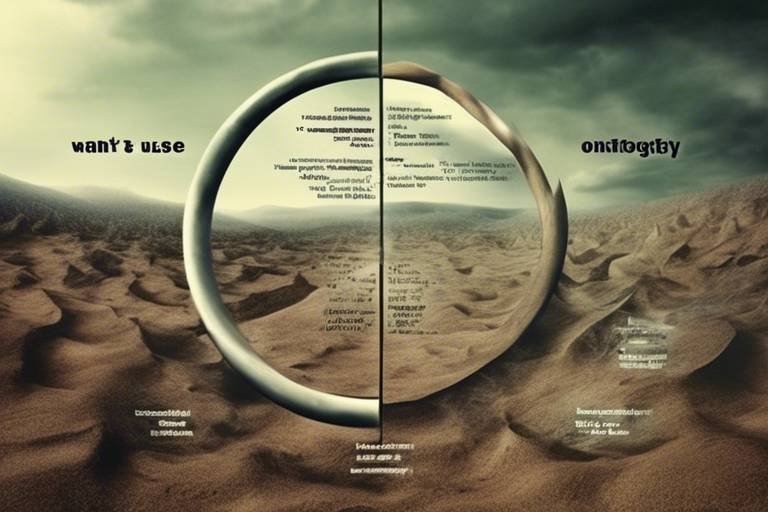Metaphysics versus Empiricism: The Ongoing Battle
The philosophical conflict between metaphysics and empiricism has been a captivating subject for centuries, igniting debates that cut to the very core of how we understand our universe. At its essence, this battle is about two distinct approaches to knowledge: one that seeks to explore the unseen and often unprovable realms of existence, and another that champions the tangible, the observable, and the scientifically verifiable. Imagine standing at a crossroads, with one path leading to the abstract and the other to the concrete. Which path do you take? This article aims to navigate these complex philosophical terrains, examining their foundations, implications, and the profound impact they have on our understanding of reality and knowledge.
Metaphysics is like the grand architect of philosophy, delving deep into the nature of reality, existence, and the fundamental principles that govern the universe. It raises questions that go beyond what we can see or measure. For instance, consider the concept of free will—is it an illusion, or do we truly have the power to choose our destinies? Metaphysical inquiry often tackles such profound questions, exploring realms that empirical observation and scientific inquiry struggle to address. It invites us to ponder the existence of abstract entities, like numbers or moral values, which don’t have physical forms but nonetheless play crucial roles in our understanding of the world. Through metaphysics, we engage with ideas that challenge our perceptions and push the boundaries of what we define as knowledge.
On the flip side, we have empiricism, a philosophy that emphasizes acquiring knowledge through sensory experience and observation. Imagine a scientist in a lab, meticulously collecting data and conducting experiments to draw conclusions. This is the essence of empiricism. It argues that all concepts must be grounded in tangible evidence, challenging metaphysical assertions that lack empirical support. For empiricists, the world is a vast playground of observable phenomena, and understanding it requires a hands-on approach. This perspective raises an intriguing question: can we truly know anything without first experiencing it? As we dive deeper into this philosophical landscape, we’ll uncover the historical context that shaped these two schools of thought.
The historical evolution of metaphysics and empiricism reveals a fascinating interplay between these philosophies. They emerged in response to each other, shaping the development of Western thought. Think of it as a philosophical tug-of-war, with each side pulling the other toward its perspective. Metaphysics, with its lofty ideals and abstract reasoning, often found itself at odds with empiricism, which demanded proof and evidence. This ongoing battle has significantly influenced subsequent philosophical debates, paving the way for modern inquiries into the nature of reality and knowledge.
Prominent figures such as Aristotle and Kant have significantly contributed to metaphysical thought. Aristotle proposed theories about existence and causality, laying the groundwork for future metaphysical inquiry. Kant, on the other hand, challenged the boundaries of our understanding, suggesting that our perceptions shape reality itself. Their ideas continue to resonate within contemporary philosophy, sparking discussions that explore the very fabric of existence.
In the realm of empiricism, philosophers like John Locke and David Hume laid the groundwork for understanding knowledge as a product of sensory experience. Locke famously argued that the mind is a blank slate at birth, filled with knowledge through experience. Hume took it a step further, questioning the very nature of causality and our ability to know anything beyond our immediate experiences. Their contributions have profoundly shaped how we perceive the world and our place within it.
Metaphysical claims often address concepts such as free will, the existence of abstract entities, and the nature of consciousness. These topics raise questions that challenge empirical validation and provoke philosophical inquiry. For instance, can consciousness be fully understood through neuroscience, or is there something more elusive at play? Such inquiries invite us to explore the limits of our understanding and the nature of reality itself.
While empiricism relies on observable phenomena, it faces limitations in addressing abstract concepts. This raises ongoing debates about the adequacy of empirical methods in comprehending the full scope of reality. Consider the concept of time—we can measure it, but can we truly understand its essence? The limitations of empirical evidence often lead to philosophical quandaries that challenge our perceptions of reality.
Examining specific philosophical cases, such as the mind-body problem or the nature of time, illustrates the practical implications of metaphysical versus empirical approaches. These cases serve as battlegrounds where both philosophies clash, revealing the complexities of human understanding. For example, how do we reconcile the physical brain with the subjective experience of consciousness? Such questions push us to consider the strengths and weaknesses of both metaphysical and empirical frameworks.
The ongoing battle between metaphysics and empiricism continues to influence contemporary debates in science, philosophy, and ethics. As we navigate an ever-evolving world, the dialogue between these two philosophies prompts critical reflections on how we understand knowledge and reality. Are we merely products of our sensory experiences, or is there a deeper reality that transcends our perceptions? This philosophical tug-of-war remains vital in shaping our understanding of existence and our place in the universe.
- What is the main difference between metaphysics and empiricism? Metaphysics explores the nature of reality beyond empirical observation, while empiricism emphasizes knowledge gained through sensory experience.
- Can metaphysical claims be proven? Many metaphysical claims, such as those regarding free will or the existence of abstract entities, often elude empirical validation, leading to ongoing philosophical debate.
- How do these philosophies impact modern science? The conflict between metaphysics and empiricism shapes discussions in science, particularly in areas like consciousness and the nature of time.

Understanding Metaphysics
Metaphysics is like the philosopher's playground, where the big questions of existence and reality come to life. It dives deep into the essence of what it means to be, exploring not just the physical world we can see and touch, but also the abstract concepts that govern our understanding of everything around us. Imagine standing on the edge of a vast ocean, looking out at the horizon. You can see the waves crashing and feel the spray on your face, but what lies beneath the surface? That’s where metaphysics comes in, probing the depths that empirical observation can’t reach.
At its core, metaphysics seeks to answer questions that are fundamental yet elusive, such as: What is the nature of reality? Do we have free will, or is everything predetermined? Is there a higher power or a universal truth? These inquiries often lead us to confront ideas that are not easily measurable or observable. While science relies on tangible evidence—like the weight of an object or the speed of light—metaphysics invites us to consider possibilities that transcend empirical boundaries. For instance, can we really quantify love, consciousness, or the concept of time? Metaphysics encourages us to explore these dimensions, even if they defy the rigid structures of scientific inquiry.
One of the fascinating aspects of metaphysics is its rich history, interwoven with the development of human thought. Ancient philosophers like Plato and Aristotle laid the groundwork by pondering the nature of being and existence. Plato's theory of forms, for example, suggests that beyond the material world lies a realm of ideal forms, representing the true essence of things. In contrast, Aristotle focused on the material world but still engaged with metaphysical questions about causality and potentiality.
As we move through the ages, metaphysics has evolved, adapting to new ideas and challenges. The Enlightenment brought thinkers like Immanuel Kant, who argued that while we can never truly know things as they are in themselves, we can understand the structures of our experiences. This tension between our perception of reality and the reality itself is a central theme in metaphysical discussions.
In today's world, metaphysics continues to spark debate and inspire inquiry. It intersects with various fields, including science, ethics, and even religion, prompting us to reflect on our beliefs and the nature of existence. As we navigate through life, the questions posed by metaphysics remind us that understanding reality is not just about what we can see, but also about grappling with the mysteries that lie beyond.
In summary, metaphysics is a profound philosophical inquiry that challenges us to look beyond the surface of our experiences and consider the fundamental principles that shape our understanding of reality. It invites us to engage with questions that may never have definitive answers, yet are essential to our quest for knowledge and meaning.

Defining Empiricism
Empiricism, at its core, is a philosophical doctrine that posits that knowledge arises primarily from sensory experience. This means that what we know about the world is heavily reliant on what we can see, hear, touch, taste, and smell. Think of it as a treasure hunt where the clues to understanding reality are hidden in our experiences. If you can’t observe it, then it’s not considered valid knowledge. This stands in stark contrast to metaphysical claims, which often delve into realms beyond our sensory perception, such as the existence of abstract entities or the very nature of reality itself.
One of the fascinating aspects of empiricism is how it challenges us to question our assumptions. For example, if someone claims that a particular phenomenon exists, empiricism demands that they provide tangible evidence to support that claim. This insistence on evidence is what makes empiricism a cornerstone of the scientific method. Scientists, for instance, rely on observations and experiments to draw conclusions about the natural world. In this way, empiricism acts as a gatekeeper, ensuring that only those ideas which can be substantiated through experience gain acceptance.
To further illustrate the principles of empiricism, let's consider some key tenets:
- Experience as the Foundation: Empiricists argue that all knowledge must be rooted in experience. This means that our understanding of the world is built upon what we have directly observed or experienced.
- Rejection of Innate Ideas: Unlike rationalists who believe in the existence of innate ideas, empiricists contend that the mind starts as a blank slate, and knowledge is acquired through interaction with the environment.
- Verification Principle: This principle states that a statement or claim is only meaningful if it can be empirically verified. If it cannot be tested or observed, it is dismissed as nonsensical.
Empiricism has played a pivotal role in shaping modern science and philosophy. Philosophers like John Locke and David Hume emphasized the importance of experience in the formation of knowledge. Locke famously described the mind as a "tabula rasa" or blank slate, suggesting that all knowledge comes from experience. Hume took this a step further, arguing that our understanding of causality itself is derived from repeated observations rather than any inherent connection between events.
However, while empiricism provides a robust framework for understanding the physical world, it does have its limitations. For instance, how do we account for abstract concepts such as justice, beauty, or love? These ideas, while significant, often elude empirical measurement. This gap has led to ongoing debates about the adequacy of empirical methods in capturing the full richness of human experience and understanding.
In summary, empiricism is a vital philosophy that emphasizes the role of sensory experience in the acquisition of knowledge. It challenges us to seek evidence and question our beliefs, fostering a culture of inquiry that has propelled scientific advancement. Yet, it also invites us to ponder the limitations of purely empirical approaches, particularly when it comes to understanding the more abstract aspects of our existence.
1. What is the main difference between metaphysics and empiricism?
The main difference lies in their approach to knowledge. Metaphysics explores concepts beyond sensory experience, while empiricism focuses on knowledge gained through observation and experience.
2. Who are some key figures in empiricism?
Key figures include John Locke, who proposed that the mind is a blank slate, and David Hume, who emphasized the role of experience in understanding causality.
3. Can empiricism explain abstract concepts?
Empiricism struggles with abstract concepts like love or justice because these ideas often cannot be directly observed or measured, leading to debates about the limits of empirical knowledge.

The Historical Context
The philosophical conflict between metaphysics and empiricism has deep roots in the history of Western thought, emerging as a response to humanity's quest for understanding the nature of reality. This ongoing debate can be traced back to ancient civilizations, where early thinkers grappled with fundamental questions about existence and knowledge. As society evolved, so did the philosophical frameworks that sought to explain the world, leading to a rich tapestry of ideas that shaped modern philosophy.
In the early days, philosophers like Socrates and Plato laid the groundwork for metaphysical inquiry. Plato's theory of forms, for instance, posited that beyond our tangible world lies a realm of abstract entities that represent the truest essence of reality. This idealist view contrasted sharply with the emerging empiricist perspective, which began to take shape in the works of thinkers such as Aristotle, who emphasized observation and experience as the primary sources of knowledge.
Fast forward to the 17th century, when the Enlightenment sparked a renewed interest in empirical methods. Philosophers like John Locke and David Hume championed the idea that knowledge arises from sensory experience. They argued that our understanding of the world must be grounded in what we can observe and measure, challenging the metaphysical claims that lacked empirical support. This period marked a significant shift in the philosophical landscape, as empiricism began to gain traction over its metaphysical counterpart.
However, the dialogue between these two schools of thought did not end there. The 18th century saw the rise of Immanuel Kant, who attempted to bridge the gap between metaphysics and empiricism. Kant argued that while our knowledge begins with experience, it is also shaped by innate concepts and categories of understanding. His work highlighted the complexities of human cognition, suggesting that both metaphysical and empirical elements play crucial roles in how we perceive reality.
As we moved into the 19th and 20th centuries, the tension between metaphysical and empirical approaches continued to evolve. Philosophers like Friedrich Nietzsche and Martin Heidegger introduced existential and phenomenological perspectives that further complicated the discourse. They questioned the very foundations of metaphysical thought, exploring themes of existence, meaning, and the nature of being itself.
Today, the historical context of metaphysics and empiricism remains relevant as we navigate contemporary philosophical debates. The interplay between these two perspectives continues to shape our understanding of knowledge, reality, and the limits of human inquiry. It invites us to reflect on how far we can go in our quest for truth, and whether we can ever truly reconcile the abstract with the observable.
| Era | Philosophers | Key Contributions |
|---|---|---|
| Ancient | Socrates, Plato, Aristotle | Foundations of metaphysical thought and early empirical observations |
| 17th Century | John Locke, David Hume | Emphasis on sensory experience as the source of knowledge |
| 18th Century | Immanuel Kant | Bridging metaphysics and empiricism; knowledge shaped by innate concepts |
| 19th-20th Century | Friedrich Nietzsche, Martin Heidegger | Exploration of existence, meaning, and the nature of being |

Key Philosophers in Metaphysics
When we dive into the realm of metaphysics, it's impossible to overlook the profound contributions of key philosophers who have shaped our understanding of existence and reality. Among these towering figures, Aristotle stands out as a foundational thinker. His work laid the groundwork for much of Western philosophy, particularly through his exploration of substance and causality. Aristotle posited that everything in the universe is composed of substances that possess inherent qualities, which interact in a causal manner. This perspective invites us to consider not just what things are, but why they are, and how they relate to one another.
Following Aristotle, we encounter the illustrious figure of Immanuel Kant, who brought a revolutionary approach to metaphysical inquiry. Kant challenged the traditional notions of metaphysics by proposing that our understanding of reality is shaped by the limits of human perception. He famously asserted that we can never truly know things as they are in themselves (the noumenal world), but only as they appear to us through our senses (the phenomenal world). This distinction raises critical questions about the nature of knowledge and reality, suggesting that our experiences are filtered through subjective lenses.
In addition to these giants, we must also consider the impact of Gottfried Wilhelm Leibniz. Leibniz introduced the concept of monads, which he described as simple substances that make up the fabric of reality. Each monad is unique and reflects the universe from its own perspective. This idea not only adds depth to metaphysical discussions about individuality and existence but also intertwines with questions about the nature of consciousness and perception.
Moreover, the 20th century saw a resurgence of interest in metaphysical questions, with philosophers like Martin Heidegger and Alfred North Whitehead contributing significantly to the discourse. Heidegger's exploration of Being delves into the essence of existence itself, while Whitehead's process philosophy emphasizes the dynamic and interconnected nature of reality, challenging static notions of being.
It's fascinating to note how these philosophers, despite their differing views, share a common goal: to unravel the complexities of existence and our place within it. Their thoughts serve as a bridge between ancient and modern philosophical inquiries, illustrating how metaphysical questions remain ever-relevant. As we ponder the implications of their ideas, we are reminded that the quest for understanding reality is not merely an academic exercise but a fundamental aspect of the human experience.
To summarize, the contributions of these key philosophers in metaphysics have profoundly influenced our understanding of existence, causality, and reality. Their ideas continue to provoke thought and debate, reminding us that the exploration of metaphysics is a journey without a definitive destination, where every question leads to new inquiries and insights.
| Philosopher | Key Contribution | Notable Concept |
|---|---|---|
| Aristotle | Foundation of Western metaphysics | Substance and causality |
| Immanuel Kant | Limits of human perception | Noumenal vs. phenomenal |
| Gottfried Wilhelm Leibniz | Concept of monads | Unique perspectives of reality |
| Martin Heidegger | Essence of Being | Existential inquiry |
| Alfred North Whitehead | Process philosophy | Dynamism of existence |
- What is metaphysics? Metaphysics is a branch of philosophy that explores the fundamental nature of reality, existence, and the principles that govern the universe.
- How does empiricism differ from metaphysics? Empiricism emphasizes knowledge through sensory experience and observation, while metaphysics often deals with concepts beyond empirical validation.
- Who are some key philosophers in metaphysics? Notable figures include Aristotle, Kant, Leibniz, Heidegger, and Whitehead, each contributing unique perspectives to the field.
- Why is metaphysics important? Metaphysics helps us understand the underlying principles of reality and existence, prompting deeper inquiries into our understanding of the world.

Influential Empiricists
When we dive into the realm of empiricism, a few names shine brighter than the rest, illuminating the path of knowledge acquisition through sensory experience. One cannot discuss empiricism without mentioning John Locke, a philosopher whose ideas laid the groundwork for modern empiricist thought. Locke argued that the mind at birth is a tabula rasa, or blank slate, suggesting that all knowledge is derived from experience. This concept challenges the metaphysical notion of innate ideas, promoting the idea that our understanding of the world is shaped entirely by what we perceive through our senses.
Another giant in the field is David Hume, who took Locke's ideas further and introduced a more skeptical approach to knowledge. Hume is known for his assertion that our beliefs about cause and effect are not based on rational deduction but rather on habit and experience. He famously questioned the validity of metaphysical claims that cannot be supported by empirical evidence, stating that if something cannot be observed, it should not be accepted as knowledge. This skepticism has profound implications, as it compels us to scrutinize our beliefs and the foundations on which they rest.
Furthermore, George Berkeley contributed to empiricism with his famous dictum, "To be is to be perceived." Berkeley challenged the materialist perspective by asserting that objects only exist as they are perceived by someone. This radical idea pushes the boundaries of how we understand existence and reality, suggesting that perception is intrinsic to the existence of the world around us. His work raises intriguing questions about the nature of reality and the role of the observer, which continue to be debated in contemporary philosophy.
These influential empiricists share a common thread: they emphasize the importance of observable phenomena in the pursuit of knowledge. They collectively challenge the metaphysical assertions that often lack empirical support, thereby shaping the discourse on how we understand reality. Their contributions not only paved the way for future philosophers but also set the stage for ongoing debates in science and ethics, as we continue to grapple with the implications of their ideas in an ever-evolving world.
To summarize, here’s a quick overview of these influential figures:
| Philosopher | Key Contribution |
|---|---|
| John Locke | Proposed the idea of the mind as a blank slate, emphasizing knowledge through experience. |
| David Hume | Introduced skepticism about causation, arguing that beliefs stem from habit rather than reason. |
| George Berkeley | Argued that existence is dependent on perception, challenging materialist views. |

Metaphysical Claims
Metaphysical claims often venture into the realms of existence and reality, probing questions that transcend the physical world. These claims can be as profound as they are perplexing, challenging our understanding of what it means to exist. For instance, consider the concept of free will. Is our ability to make choices a mere illusion, or do we genuinely possess the power to decide our destinies? This question not only stirs philosophical debate but also touches on ethical implications about responsibility and accountability.
Another fascinating area of inquiry involves the existence of abstract entities, such as numbers or moral values. Can these entities exist independently of human thought? Metaphysicians argue that they do, suggesting that numbers, for instance, have an existence beyond mere physical representation. This leads us to ponder: if numbers exist in a realm of their own, what does that say about the nature of reality itself? Are we merely observers in a universe governed by laws that exist independently of our perception?
Furthermore, the nature of consciousness itself poses a significant metaphysical claim. What is consciousness? Is it simply a byproduct of brain activity, or does it represent something more substantial? The struggle to define consciousness reflects the broader metaphysical quest to understand the essence of being. This inquiry raises the question: can consciousness exist without a physical substrate, or is it inherently tied to our biological makeup?
To illustrate these metaphysical claims, let’s consider a few key examples:
- Free Will: The debate over whether humans have the agency to make choices or if our actions are predetermined.
- Existence of Abstract Entities: The discussion around whether concepts like love, justice, and mathematical entities exist independently of human thought.
- Nature of Consciousness: The exploration of whether consciousness is a fundamental aspect of the universe or merely a byproduct of physical processes.
These claims not only provoke thought but also challenge the very foundations of empirical validation. While empiricism demands tangible evidence and sensory experience, metaphysical claims often elude such scrutiny, leading to a fascinating yet contentious dialogue between the two philosophical camps. This ongoing debate invites us to reflect on the limitations of our understanding and the potential for knowledge that lies beyond empirical reach. In a world where science seeks to explain the universe, metaphysics dares us to ponder the questions that science may never fully answer.
- What are metaphysical claims? Metaphysical claims are assertions about the nature of reality, existence, and the universe that go beyond empirical observation.
- How do metaphysical claims differ from empirical claims? Metaphysical claims often deal with concepts that cannot be observed or measured, while empirical claims rely on sensory experience and evidence.
- Can metaphysical claims be proven? Many metaphysical claims cannot be empirically proven or disproven, leading to ongoing debates in philosophy.

Empirical Evidence and Its Limits
Empiricism, at its core, is all about observable phenomena. It champions the idea that knowledge should be grounded in what we can see, touch, and measure. Think of it as a detective, piecing together clues from the physical world to construct a narrative of understanding. However, as much as this approach has propelled advancements in science and technology, it also has its limitations. One of the most significant challenges empiricism faces is its struggle to address abstract concepts that fall outside the realm of direct observation.
For instance, consider the concept of justice. While we can observe actions and their consequences, the essence of justice itself is not something we can physically measure or observe. This raises a crucial question: can we truly understand complex ideas like justice, morality, or even love through empirical means alone? The answer is often a resounding no. These concepts require a level of abstraction and interpretation that empirical methods simply cannot provide.
Additionally, empirical evidence is often limited by the tools and methods available at any given time. For example, in the early days of astronomy, many celestial phenomena could only be theorized about because we lacked the technology to observe them. It wasn't until the invention of the telescope that we could gather concrete evidence about planets and stars. This historical perspective leads us to ponder: what truths about our universe might we be missing today simply because of our current technological constraints?
Moreover, the reliance on sensory experience can lead to a form of cognitive bias. People often interpret observations through the lens of their own experiences and beliefs, which can skew the understanding of empirical data. This is particularly evident in fields like psychology and social sciences, where human behavior is influenced by a myriad of factors that are not easily quantifiable.
In light of these limitations, it becomes clear that while empirical evidence is invaluable, it is not the sole pathway to understanding reality. The interplay between metaphysical inquiry and empirical observation is essential for a more holistic grasp of knowledge. By acknowledging the strengths and weaknesses of both approaches, we can foster a richer dialogue about the nature of existence and our place within it.
To illustrate the limitations of empirical evidence further, consider the following table that contrasts empirical evidence with metaphysical inquiry:
| Aspect | Empirical Evidence | Metaphysical Inquiry |
|---|---|---|
| Nature of Inquiry | Observable and measurable | Abstract and theoretical |
| Examples | Scientific experiments, physical measurements | Theories of existence, concepts of free will |
| Limitations | Cannot address abstract concepts | May lack empirical validation |
| Methods | Observation, experimentation | Philosophical reasoning, speculation |
In conclusion, while empirical evidence plays a crucial role in shaping our understanding of the world, it is essential to recognize its limits. By embracing both empirical and metaphysical perspectives, we open ourselves to a more comprehensive understanding of reality. This ongoing dialogue between the two realms not only enriches our philosophical inquiries but also enhances our grasp of the complexities of existence.
- What is the main difference between metaphysics and empiricism?
Metaphysics deals with abstract concepts and the nature of existence, while empiricism focuses on knowledge gained through sensory experience and observation. - Can empirical evidence support metaphysical claims?
While empirical evidence can provide insights, many metaphysical claims, such as those about free will or consciousness, often require a different approach for validation. - Why are abstract concepts difficult for empiricism?
Abstract concepts like justice or morality cannot be directly observed or measured, making them challenging for empirical methods to fully address.

Case Studies in Philosophy
The philosophical landscape is rich with intriguing case studies that illustrate the ongoing tension between metaphysics and empiricism. One of the most profound examples is the mind-body problem, which questions the relationship between mental states and physical processes. This dilemma has puzzled philosophers for centuries: Are our thoughts merely byproducts of brain activity, or do they exist independently? Metaphysical perspectives often posit that consciousness is a fundamental aspect of reality, suggesting that mental phenomena cannot be fully explained by physical processes alone. In contrast, empiricists argue that all knowledge about the mind must be grounded in observable behavior and neurological evidence, leading to fascinating discussions about the nature of consciousness.
Another compelling case study is the nature of time. Metaphysical theories propose that time could be an absolute entity, existing independently of human perception. Think of it as a river flowing steadily regardless of whether anyone is there to observe it. On the other hand, empiricists contend that our understanding of time is intimately tied to our sensory experiences—how we perceive the passage of time can vary dramatically based on context, emotion, and even culture. This raises an essential question: Is time a universal constant, or is it merely a construct shaped by our experiences?
Furthermore, the debate over free will serves as another vital case study. Metaphysicians often argue that free will is an essential component of human existence, suggesting that individuals have the power to make choices independent of deterministic forces. This perspective aligns with the belief in moral responsibility, as it allows for the notion that individuals can be held accountable for their actions. Conversely, empiricists might challenge this view by pointing to neurological studies that suggest our decisions may be influenced by subconscious processes beyond our control. This raises the question: If our choices are determined by factors outside our awareness, can we truly claim to have free will?
To further illustrate these case studies, consider the following table that summarizes the contrasting views on these philosophical dilemmas:
| Philosophical Issue | Metaphysical Perspective | Empirical Perspective |
|---|---|---|
| Mind-Body Problem | Consciousness exists independently of the brain. | Knowledge of the mind is derived from observable behavior. |
| Nature of Time | Time is an absolute entity. | Time is perceived subjectively and varies across contexts. |
| Free Will | Humans possess the ability to make independent choices. | Choices are influenced by subconscious processes and determinism. |
These case studies not only highlight the philosophical conflict between metaphysics and empiricism but also demonstrate how these debates continue to shape our understanding of complex issues. As we navigate through these philosophical waters, we are reminded that the questions we ask often matter just as much as the answers we seek. The interplay between these two schools of thought invites us to explore deeper into the nature of reality, knowledge, and our place within it.
- What is the main difference between metaphysics and empiricism? Metaphysics explores fundamental questions about existence and reality beyond empirical observation, while empiricism emphasizes knowledge gained through sensory experience.
- How do case studies illustrate the conflict between these philosophies? Case studies such as the mind-body problem, the nature of time, and free will show how metaphysical claims often challenge empirical validation, leading to rich philosophical debates.
- Why is the mind-body problem significant? It raises essential questions about consciousness, identity, and the relationship between mental and physical states, influencing both philosophy and neuroscience.
- Can these philosophical debates impact modern science? Yes, the ongoing discussions between metaphysics and empiricism continue to influence scientific inquiry, ethical considerations, and our understanding of reality.

Modern Implications
The ongoing battle between metaphysics and empiricism is not just a relic of philosophical discourse; it has profound implications in our modern world. As we navigate through the complexities of contemporary science, ethics, and technology, these two schools of thought continue to shape our understanding of knowledge and reality. For instance, in fields like quantum physics, metaphysical questions about the nature of reality and existence are becoming increasingly relevant. Are particles merely probabilities, or do they have an independent existence? Such questions challenge empirical methods that rely solely on observation.
Moreover, in the realm of artificial intelligence, the debate over consciousness and free will takes center stage. Can a machine truly possess consciousness, or is it merely simulating human-like responses? This inquiry is deeply metaphysical, pushing the boundaries of what we consider to be knowledge and experience. The implications extend into ethical considerations as well, as we grapple with the moral status of sentient machines. Should they have rights? These questions force us to confront the limitations of empirical evidence in understanding complex phenomena.
In addition, the rise of post-truth politics highlights the tension between empirical evidence and metaphysical beliefs. Many people today prioritize personal beliefs over factual evidence, leading to a society where subjective experience often trumps objective reality. This shift raises critical questions about how we validate knowledge and what constitutes truth in an age where misinformation can spread like wildfire.
To illustrate the impact of this philosophical conflict, consider the following table that summarizes key areas where metaphysical and empirical perspectives collide:
| Field | Metaphysical Perspective | Empirical Perspective |
|---|---|---|
| Quantum Physics | Nature of reality as probabilistic | Observable phenomena and measurements |
| Artificial Intelligence | Consciousness and free will | Behavioral responses and algorithms |
| Ethics | Morality as inherent or constructed | Evidence-based consequences of actions |
| Politics | Belief systems and ideologies | Fact-based analysis and data |
As we delve deeper into these modern dilemmas, it becomes clear that metaphysics and empiricism are not merely academic concepts but are actively influencing our daily lives. The interplay between these philosophies invites us to critically reflect on our understanding of reality, urging us to seek a balance between what we can observe and what we can theorize. In doing so, we not only enrich our philosophical discourse but also enhance our capacity to navigate the complexities of the modern world.
- What is the main difference between metaphysics and empiricism? Metaphysics explores the nature of reality beyond empirical observation, while empiricism emphasizes knowledge through sensory experience.
- How do modern technologies challenge these philosophical views? Technologies like AI raise questions about consciousness and free will, challenging empirical methods that rely on observable behavior.
- Can metaphysical claims ever be proven? Metaphysical claims often deal with concepts that are difficult to test empirically, making them challenging to validate scientifically.
- Why is the battle between these philosophies relevant today? The clash between subjective beliefs and objective evidence is increasingly prominent in politics, science, and ethics, affecting how we understand truth and knowledge.
Frequently Asked Questions
- What is metaphysics?
Metaphysics is a branch of philosophy that explores the fundamental nature of reality, existence, and the principles that govern the universe. It goes beyond what can be observed and measured, delving into questions about the nature of being, causality, and even concepts like free will.
- How does empiricism differ from metaphysics?
Empiricism emphasizes knowledge gained through sensory experience and observation, arguing that all concepts must be grounded in tangible evidence. In contrast, metaphysics often deals with abstract concepts that may not be directly observable, leading to a fundamental conflict between the two philosophies.
- Who are some key philosophers associated with metaphysics?
Prominent philosophers like Aristotle and Immanuel Kant have made significant contributions to metaphysical thought. They proposed theories about existence, causality, and the nature of reality, which continue to influence modern philosophical discourse.
- What are some influential figures in empiricism?
Philosophers such as John Locke and David Hume are foundational figures in empiricism. They argued for the importance of sensory experience in forming knowledge and understanding the world, laying the groundwork for modern empirical methods.
- What are some examples of metaphysical claims?
Metaphysical claims often address complex concepts like the existence of abstract entities, the nature of consciousness, and the debate over free will. These questions challenge empirical validation and provoke deeper philosophical inquiry.
- What limitations does empiricism face?
While empiricism relies heavily on observable phenomena, it struggles to adequately address abstract concepts, such as morality or the nature of time. This limitation leads to ongoing debates about the sufficiency of empirical methods in fully comprehending reality.
- How do metaphysics and empiricism influence modern debates?
The ongoing battle between metaphysics and empiricism significantly impacts contemporary debates in science, philosophy, and ethics. It prompts critical reflections on our understanding of knowledge and reality, especially in an ever-evolving world.


















